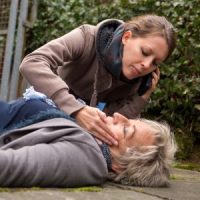Understanding Rhode Island’s Good Samaritan Laws

None of us want to have to witness an accident, or someone in peril, or someone who is injured. But when you do, you may have an obligation to do something about it because Rhode Island is one of the few states in the nation, where a bystander cannot just sit idly by and do nothing.
The Obligation to Act
By law, if a bystander does not render reasonable assistance to someone in an accident, that bystander can be liable for criminal prosecution. A bystander must render aid to someone in need, so long as they can do so without endangering themselves.
But rendering aid sometimes involves a degree of risk. Thankfully, many courts have held that bystanders who are injured in the course of rendering aid, can get insurance benefits when they otherwise may not have been entitled to them.
In one case, a good Samaritan was hit by a car as she exited her vehicle to attend to someone who had been in a car accident. A Rhode island court allowed her to recover insurance benefits.
Immunity From Liability
Bystanders who render aid to someone in need, are also immune from liability for damages that they may cause by rendering that aid, so long as they do so in good faith, and so long as they don’t act with recklessness.
As an example, if someone tried to perform CPR on someone in need, and caused that person injury, there would be no liability. If the bystander tried to perform emergency surgery by the roadside when the bystander had no medical training, that could give rise to liability, as that would be beyond just negligent.
Most good Samaritan laws that offer immunity, apply only to emergency situations.
Good Samaritan laws apply both to trained personnel, like emergency responders, but also to lay people, who may have no training at all.
The good Samaritan laws also apply to people who are using AEDs (defibrillators) so long as the users are trained. So, businesses that have employees that are untrained in the proper usage of AEDs, can still be liable for the failure to properly train staff in the usage of defibrillators.
What the Law Means
For bystanders rendering aid, the laws set up a number of scenarios.
On the one hand, a bystander is, to the extent described above, immune from liability when rendering aid.
But a bystander also can sue for damages, if the bystander is injured by someone else, while rendering aid, and can make claims on applicable insurances, for injuries sustained while rendering aid to someone in need.
Drug Overdosing
Rhode Island good Samaritan laws also protect people who may be helping someone who is overdosing on drugs.
For example, someone who called 911 to help someone else who was overdosing, could not be prosecuted for drugs found on that person. Although this part of the good Samaritan law deals with criminal law, it would also provide some protection and immunity from civil liability should the person assisting the overdosing person do something wrong or should the person have drugs on or with him.
Were you injured while rendering aid to someone else? Contact our Rhode Island personal injury lawyers at Robert E. Craven & Associates at 401-453-2700.
Sources:
caselaw.findlaw.com/ri-supreme-court/1864804.html
aed.com/rhode-island-aed-statutes-regulations

